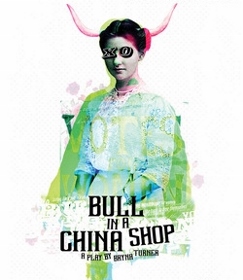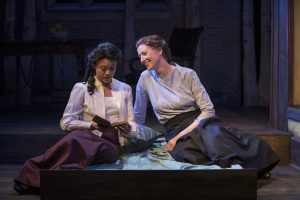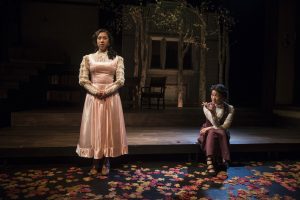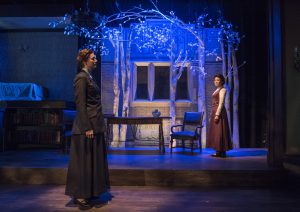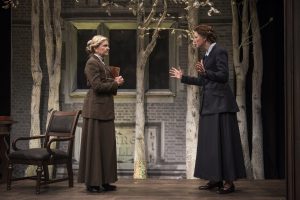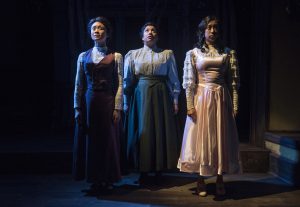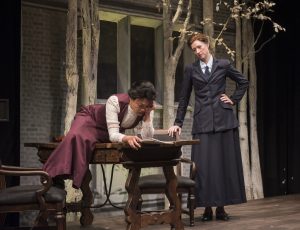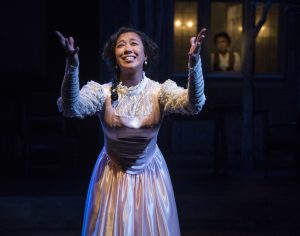A POWER COUPLE WORTH RECLAIMING
Lest we forget two women who long ago shaped their future into our present, witness Bull in a China Shop. Written by Mount Holyoke alumna Bryna Turner, this concentrated one-act pays a conditional tribute to Mary Wooley and Jeanette Marks, radical academics and long-time lovers. The former was President of Mount Holyoke College from 1900 to 1937 and prominent in the suffragette cause and pacifist movements during two wars. Also vital to the campus, the latter, her lover, was a professor of English and poetry who believed, even to the point of infidelity, of blurring the distinctions between students and teachers. One a tactical progressive, the other a driven zealot, they were so outspoken then that it feels right now that they still speak and teach.
But in only 80 minutes, this 2017 drama — a Midwest premiere from About Face Theatre well helmed by Keira Fromm — is a tad too terse: It’s selective in its storytelling (not following up on at least one crucial crisis) and melodramatically inclined to dig out the drama in their careers as much as any legacy. Even more regrettable are such anachronisms and buzz words as “globalism,” diversify,” “fan fiction,” and “inherited belief systems” — and a flagrant use of the F-word: Turner, it seems, thinks that women matter more when they swear like men, a too easy leveling by half.
In fact Wooley and Marks talked in the terms of their times: The fact that these suspiciously intimate women could flourish in and influence the genteel environs of a prestigious women’s seminary is all the more admirable without contemporary dog whistles. (Ultimately a desire for family values — a curriculum of domestic science rather than socialist poetry — led to Wooley’s forced retirement, though Marks continued teaching until 1939. They remained together in Westport, New York until Wooley died of a stroke in 1947. Marks lived until 1964.)
No question, these unacknowledged life partners for 55 years were, as they put it, “fresh blood for the beginning of a new century.” These crusading pursuers of enlightenment were ahead of their time and very fit for ours. Embodying the disruptive title, Wooley believed in education as the key to women’s advancement and pursued parity in opportunity and achievement. Hiring only women (her feminism was sometimes seen as favoritism), she also abolished the requirement that students cook and clean to pay their way (“The canon is suspect”). Kelli Simpkins plays her with equal doses of ramrod dignity and cunning charm. That balance is required because Wooley’s pliable practicality about votes for women and other issues, which Marks condemned as opportunism, explains her splendid survival.
Operatically semi-suicidal and more inflexibly ideological, Emjoy Gavino’s hypochondriacal Marks is a rich partisan. (Drily defending her proto-feminist passions, she sneers that “The only field for women is a graveyard.”) Marks exuberantly delights both in the details of Virginia Woolf’s wonderful Orlando and the arms of Pearl (Audora Adachi-Winter), a troubled student. This possessive acolyte threatens the women’s relationship: In a truly menacing moment, a manic Pearl threatens elaborate violence against Marks. It’s an ugly episode which the play, after farcically introducing it, abruptly abandons, leaving us to wonder how Wooley and Marks reconciled over the latter’s betrayal and whether a seemingly crazy Pearl was ever disciplined or treated.
But this truncated scene is typical in a cherry-picking plot that rushes through time, sometimes leaving us in the lurch. (You would never know, for instance, that an abortive attempt to disarm Hitler, for which Wooley was hired to provide the “feminine perspective” on negotiations, took place in 1933, well before Hitler invaded Poland as the play wrongly suggests.)
Equally sweet and sour, the script compares these soulmates to swans who seem serene above the surface but below are churning wildly to drive their course. Fromm’s staging honors that ardor. The marvelous Mary Beth Fisher is characteristically invaluable as the stony-faced dean who glacially affects damage control across the decades. Adithi Chandrashekar is effective as a true believer representing the many converts collected on campus.
Perfectly pictured in William Boles’ pastoral-perfect setting, Bull in a China Shop is a wonderful recovery, recounting a vital slice of progress. Revolutions always start small, so there’s much to be gained by being present at their creation.
photos by Michael Brosilow
Bull in a China Shop
About Face Theatre
Theater Wit, 1229 W. Belmont Ave.
Wed-Sat at 7:30; Sun at 3
ends on June 30, 2018
for tickets, call 773.975.8150 or visit About Face
for more shows, visit Theatre in Chicago
